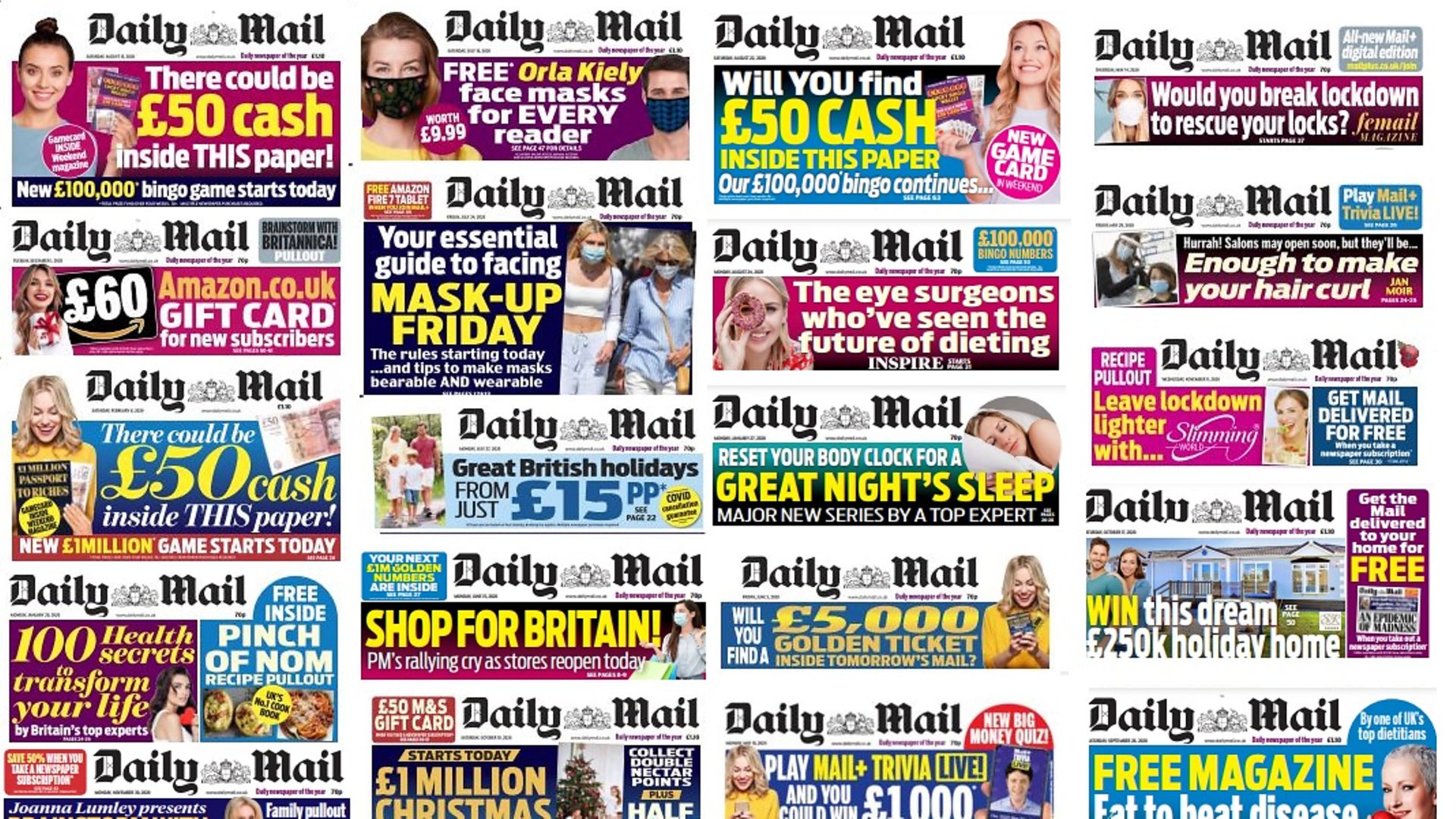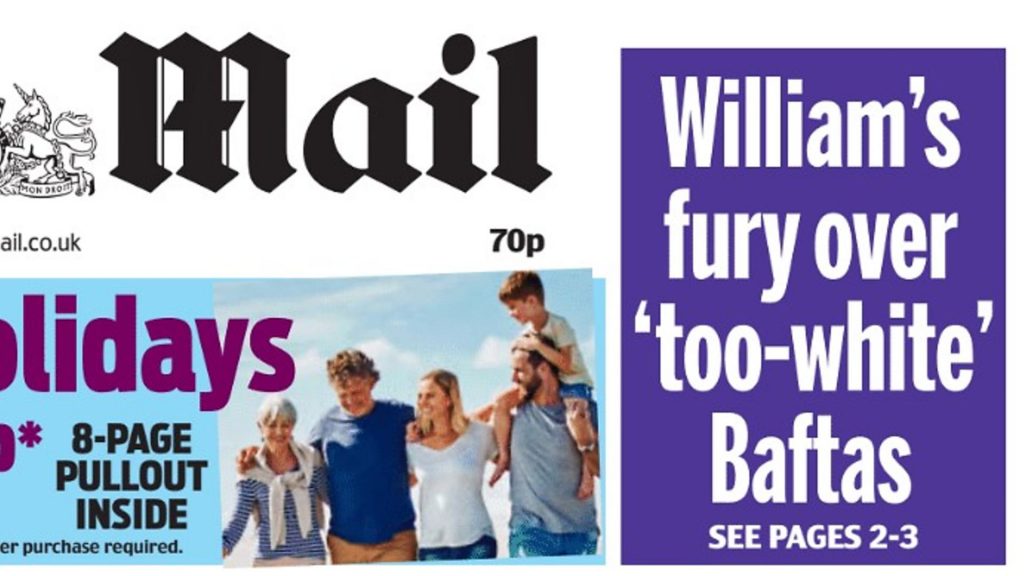
Every single person in a promotional picture on the front of the Daily Mail last year was white – including the carefree model family alongside the headline “William’s fury over too-white BAFTAs”
Do you have the faintest idea what the prime minister looks like? No, I haven’t a clue either. If only newspapers would show his face a bit more often. And what about our royal family? The head of state? That couple that went off to America? We never see them. All these people at the top of our society: invisible.
Who am I kidding? In the first three months of this year, Boris Johnson was the main national newspaper image 57 times, five behind the ‘winner’, the Duchess of Sussex. Between them, the prime minister and the royals were prominent on more than a third of the newspaper front pages published between January and March (*excluding the Financial Times).
The royals have certainly been in the news and we know that they sell papers. Johnson has had a fair bit on his plate, too. But do we need reminding quite so often that his hair could do with a good brush? Do people really see him grinning out from the Express as they pay for petrol and think “Ooh, I’ll buy that”?
In another era, photographs of our top politicians were the staple for serious papers. But men in suits went out of fashion half a century ago; good-looking women are now the preferred option. Which makes Johnson’s ubiquity – he was also pressed into service for nearly 100 little text-breaker cut-outs – all the more baffling.
Unless you happen to be an old cynic who suspects that so long as the royals and the prime minister (and his acolytes) occupy so many of these premium places, there is less opportunity for those challenging the status quo to make their presence felt.
Like Keir Starmer? He turned up twice, while Nicola Sturgeon and Alex Salmond were the only other non-Conservative politicians to appear on any front page. We actually saw more of the Russian opposition leader than the British one.
Consider the Covid vaccination programme. Apart from guest appearances by unhelpful EU types, the illustration of choice has been the prime minister, a syringe, or a nurse administering a jab (sometimes you strike lucky and get all three at once). The nurse is almost always white, as are those being injected.
Which is odd, given that people of colour make up such a big proportion of both NHS workers and Covid victims – and especially when you’re trying to persuade black and Asian people to get inoculated. Nadhim Zahawi, the minister supposedly responsible for the roll-out, appeared twice.
The mainstream press doesn’t care for social media and a common criticism is that they act as echo chambers, entrenching people in their views. But so do newspapers. Indeed, this is a pro-European newspaper for pro-European readers.
The Daily Mail speaks for and to the Conservative suburban middle-class, not the poor of Hartlepool. The Daily Telegraph reaches out to the country set, not to the black communities of Bristol. And, as one Telegraph editor said, readers like to see pictures of “people like themselves”. So the subjects of their front-page photographs are predominantly white.

Last year there were 807 white faces on the Mail‘s front against 80 non-white – of which 40 belonged to Meghan. Among the others, ten were related to crime or terrorism and six were Cabinet ministers (three apiece of Priti Patel and Rishi Sunak). There was one out-and-out hero – Patrick Hutchinson, who rescued a far-right protester at the BLM demo – and just two ordinary little girls going to school.
There was no space for even a postage stamp of history-making Kamala Harris or of Marcus Rashford, who made quite an impact beyond the football pitch last year. There wasn’t even a BAME face among 13 uniformed staff celebrating the Mail Force cavalry bringing PPE to a Rochdale care home. What’s more, every single person in a promotional picture was white – including the carefree model family alongside the headline “William’s fury over too-white Baftas”.
The Mail is far from unique in this imbalance. In the first three months of this year, 80% of the 3,500 faces that appeared on national front pages were white. Which is about the “right” proportion, given the country’s overall ethnicity. Except the figures are skewed by the Guardian, where 38% were non-white, and by a lot of tiny puff pictures of footballers. When it came to the main image, 124 out of 797 featured a non-white face – exactly half of them being Meghan’s.
This lack of diversity is apparent not only in the pictures on the front, but in the words inside. Of 150-odd writers with a fixed slot on the general comment pages, just ten are not white. In the Conservative press, the Telegraph’s Sherelle Jacobs and Matthew Syed of the Sunday Times are alone in being free to roam across a range of subjects.
Others are brought in because of their colour only to opine on the latest race issue – often to perpetuate the “everything’s all right, nothing to see here” line. As with Kenneth Olisa in the Mail on “Why I, as the Queen’s first black Lord Lieutenant, do not believe the royals are racist”.
This is, of course, exactly what the government is accused of doing with its race report. Tony Sewell’s commission duly obliged and the Mail was at the front of the queue to hail Britain as a beacon for the world.
When Prince Harry accused sections of the Press of being bigoted, Ian Murray of the Society of Editors came out fighting with a hasty “Oh no we’re not”. Hundreds of journalists of colour and a clutch of editors called back “Oh yes we are”. Murray quit and the society promised robust rebuttal of its initial statement.
When that was unforthcoming, board member Eleanor Mills resigned, saying the chronic lack of diversity in newsrooms amounted to structural racism: “If those making the decisions and writing the stories are not representative of the broader population, the Press becomes not a true reflection of society, but a distorting lens.”
It’s time to go to Specsavers.
What do you think? Have your say on this and more by emailing letters@theneweuropean.co.uk
Warning: Illegal string offset 'link_id' in /mnt/storage/stage/www/wp-includes/bookmark.php on line 357
Notice: Trying to get property 'link_id' of non-object in /mnt/storage/stage/www/wp-includes/bookmark.php on line 37






